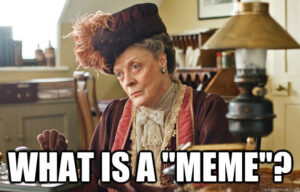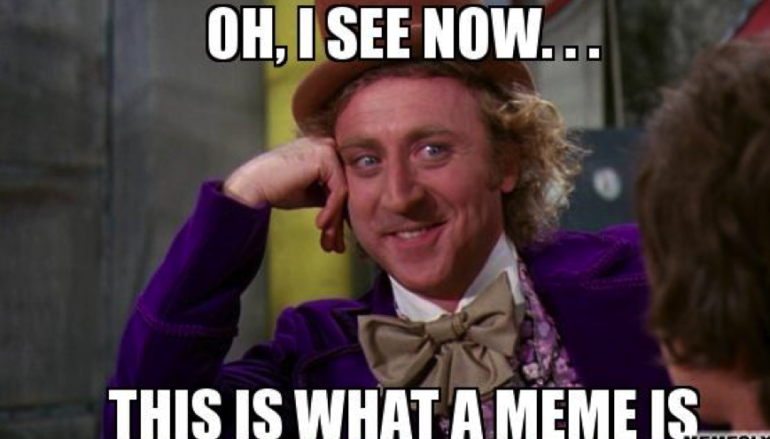Business, politics & social media are like oil and water: They don’t mix. As I watch the steady stream of political garbage flow like the Mississippi River to the delta of my Facebook feed, I shake my head and sigh: SMAD.
Social Media Affliction Disorder, or SMAD, is a condition where social media infects the frontal lobe—the part of the brain that controls impulses—and eventually renders it useless, leaving the individual defenseless. All ability to recognize right and wrong disappears.
And friends, SMAD is no joke. It’s effecting millions. It can cripple relationships and hurt your livelihood. Don’t be a victim.
Personal politics and social media are a wicked cocktail.
 Case on point: A business acquaintance and Facebook “friend” with 244 people in her FB network recently posted a meme—rhymes with team and is a cultural or social idea that is usually in the form of a virally-transmitted graphic—that called out people who would vote for a particular candidate as ignorant. Obviously she suffers from SMAD.
Case on point: A business acquaintance and Facebook “friend” with 244 people in her FB network recently posted a meme—rhymes with team and is a cultural or social idea that is usually in the form of a virally-transmitted graphic—that called out people who would vote for a particular candidate as ignorant. Obviously she suffers from SMAD.
Of course, she could have taken the time to initiate an intelligent conversation about the issues or candidate she supports, but she chose the easy way and posted a meme that called a percentage of people in her personal network ignorant. A poster child for SMAD, the affliction makes her unaware that the later will likely hurt her more than it will her targets.
Reality check: Posting a meme is not going change anyone’s mind, if that’s what she had in mind; who knows. Nor is it going to reach the great unwashed masses she hopes to offend, unless she has her FB account designated “Public.” Ah, me. Such a condition. Sad. A waste of her time and more…
The facts of the matter.
What we do know is that Facebook is not anonymous. What we also know is that a percentage of the 200+ folks in her network now know that she openly believes they are ignorant. Be careful, karma can be a bitch.
And then there was this…
From a highly educated professional woman, whom I had recently short-listed to refer to a client in need of the type of services she offers, came this delightful missive:
“What is wrong with all these people voting for _________?!! It pains me to imagine living in a country where _________ could be our next president.”
What is wrong with these people is that they have their own opinion. If you had only asked instead of convicting them without a trial!
If it had been one post, I probably could have over looked it. But a congestion of angry political memes on her profile page forced the diagnosis: SMAD. Certainly she cannot believe that at least a percentage of her 985! Facebook friends would not be offended? Or worse, consider her lacking in social discipline. Which led me to cross her off the list entirely. Business and politics is a tricky mix and one that I was not willing to bet on by introducing her to a prospect.
Will it make or break her bottom line by losing a referral source, probably not. Still, it made me shiver a bit to realize that a single Facebook post—which is certainly within anyone’s right to free speech—impacted a business opportunity so decisively.
In the words of a colleague:
“I have political opinions but I would never share them in a business setting or on LinkedIn or Twitter. Even on FB I have generally limited my commentary. I have as much interest in converting others to my views as I have in converting to theirs. And, if it offends prospects or clients, what’s the point?”
Can you afford to lose business?
Sometimes I’m surprised at the tone, sometimes it’s the material, but either way if political ire is coming from professional associates among my Facebook friends I’m convinced that they have lost their frontal lobes to SMAD. Who knew there was so much anger or political angst residing in those smiling profile pictures?
If you use social media for business, you cannot wear your heart on your sleeve!
If you mix personal and professional acquaintances in your networks, you must be particularly savvy. It is the old saying, politics and religion are dangerous turf at social events, and Facebook is the equivalent of such. When it comes to politics, you’re bound to piss someone off.
According to another professional and friend:
“I liken my FB to a holiday party I would throw. I have professional acquaintances, professional friends, friends from high school and college, my family, members of my fellowship, etc. I’m also a political junkie, having been a lobbyist at one point, early in my career. I like to discuss the issues, and we do on my FB wall, but once people start crossing the line, which is easy to do when you are not face-to-face, I start issuing warning and deleting folks.”
What the research says.
But don’t just take it from me. Here is wisdom from a 2012 study from Pew Research Center on mixing social networking and politics: They don’t mix as well as one might think—especially on Facebook.
“Almost four-in-ten users discovered through postings by “friends” that their political beliefs were different than they thought. Some users even blocked, un-friended, or hid those users’ posts from the news feed because they so strongly disagreed, or they were just sick of seeing so many posts all the time.”
The study also reported that among social networking site users, who interestingly comprised a higher contingent of liberally leaning individuals, only 25 percent agreed or mostly agreed with their friends’ political postings! Seventy-three percent of users “only sometimes” agreed or never agreed! Where there was disagreement, 66 percent said that they usually ignore posts, and only 28 percent of those users said they respond with comments or posts of their own. A mere five percent said it’s all circumstantial.
Still, for some users, politics is an off-limits subject. The Pew study found that 22 percent have decided not to post political comments or links to political material because they were worried it might upset or offend someone.
[Download a PDF version of the full Pew Internet & American Life report here.]
Could being political on social networking sites like Facebook be professional suicide?
ReadWrite.com, one of the most widely read and respected tech news sites in the world, goes as far to say that some conversations on social networks create echo chambers of agreement and mutual outrage rather than real, honest discussion, and that everyone knows that it’s hard to get political anywhere without upsetting at least a few “friends.”
I couldn’t agree more. Although it may not be professional suicide, the consequences are a hassle.
During the 2012 presidential election cycle, albeit a less controversial one than the current, I asked a few of my legal marketing colleagues where they stand on the issue.
“I definitely fall into the camp of keeping my political opinions to myself. While a lot of my clients know which side of the fence I come down on, I can’t just assume that they do, and a number of them are friends of mine on here [Facebook]. I don’t necessarily have a problem with people voicing their support one way or the other, but I DO have a problem with all the negative rhetoric I’m seeing lately—when I see someone name call or label an entire political party I really lose a lot of respect for that person. A spirited, fair debate is one thing, saying that people are “stupid” because of the way that they vote is entirely different.”
“I have strong political opinions, but I don’t post about them on Facebook anymore (though I might “like” something a friend posted), and NEVER on Twitter. It causes too much heartache.”
“I say Facebook is fair game for politics. I don’t discuss politics on Twitter or on LinkedIn, but Facebook is much more personal and for conversations with actual friends. I may tone down political rhetoric, but personally I don’t invite people into my Facebook circle of friends that I wouldn’t feel comfortable having a conversation about politics with.”
“If your brand, reputation, performance for your clients or general personality is supported by showing one’s political, religious or any strong opinions, then by all means, go for it. If not, and you understand the potential for turning away those who don’t agree with you, then proceed with caution. The same rules apply for F2F [face-to-face] communication as well as Social Networking. Be yourself, but don’t be offensive, destructive, slanderous, unethical. [Be] positive, encouraging, intelligent, or kind unless you really mean to be [otherwise], and are fully prepared for what comes your way.”
Your turn.
So readers, can you have a political voice on Facebook and still be professional? Of course you can. But, should you? If even a small percentage of your followers, friends, and associates have differing opinions, shouldn’t you respect that, and respect them? Calling people ignorant, clueless, or stupid in a business setting does not “win friends and influence people,” in the words of Dale Carnegie. And that’s what business is about. People do business with people they know, like, and trust, not because of political persuasion or choice of candidate. So, here’s my advice for business persons: Save your personal political opinions for people who care—the candidates on your ballot.
If you are suffering from SMAD and need an intervention, contact the VMO.
______________________________





